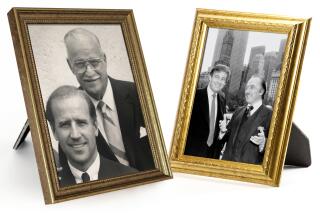Dad, Rush Limbaugh and me
- Share via
A few months ago, I helped my father pack up his apartment in San Diego in preparation for his move to an assisted living facility. He was ill and could no longer live alone, and I wanted him nearer to my home in Los Angeles.
I doubt that such a task is ever easy, with both parent and child aware that the burden of caring has shifted from one generation to the next. But in our case, things were even more loaded because of our politics. He was a passionate and devoted fan of Rush Limbaugh. I, to put it mildly, am not.
My father listened to Limbaugh’s syndicated radio show every day, contributed to his charities, wore Limbaugh caps and espoused political views that seemed so extreme to me that I regularly asked myself how it was possible for someone like me to be his daughter. Yet somehow we had always managed to connect despite our differences, and we loved each other.
That doesn’t mean it was always easy.
On the day we were packing, with both of us understandably on edge, I came across a stash of Rush Limbaugh caps, maybe half a dozen of them, each with a different year printed on the front. I couldn’t let it pass.
“Can’t we get rid of these?” I asked. “Rush Limbaugh is nasty and mean-spirited. He doesn’t like women and, if he knew me, he would hate me and everything I stand for. Can’t you at least stop wearing these caps?”
My father reacted indignantly. “Rush is one of the great men of this age,” he insisted. He was keeping the caps.
I had to go outside to calm down. My father, also shaken, went back into his bedroom.
I knew that he had trouble understanding how I, a well-educated woman, could hold such wrongheaded beliefs. And I felt the same way about him. He was highly educated — a psychiatrist with multiple advanced degrees in science and medicine. He was Jewish and deeply religious, donating regularly to charities helping those who struggled with life’s challenges.
But he hated President Obama and thought that government was at the root of all evil. He refused to join AARP because he believed it was socialist. He read voraciously but focused on right-wing historical texts that blamed everything wrong with the American economy on FDR and the New Deal. He had planned to vote for Michele Bachmann if she had made it to the California primary last year.
I didn’t want to get into arguments every time we saw each other, but sometimes I couldn’t help challenging him. His political beliefs were rooted in the idea that people should take care of themselves and not depend on government for things like healthcare and sustenance. Yet he had benefited from the GI Bill, Social Security and Medicare. “Isn’t it great that the government provides you with so much?” I’d ask.
He usually made it clear by his silence that he didn’t intend to take the bait. And the truth was, as he told me regularly, he was proud of me despite our differences.
On the day of the hat dispute, I went back into his bedroom after I had collected myself.
“Sweetheart, I want to tell you something,” he said.
“It’s OK, Dad,” I replied. “I know that we disagree on many things, so let’s just not talk about politics.”
But he persisted. “I’ve been thinking,” he said. “And I’ve come to the conclusion that although I really like Rush Limbaugh, I love you more. So I’m going to give up the caps.”
My father died this month. He was 87 years old and went peacefully. I loved him, and I miss him greatly. But his death has also gotten me thinking.
I suspect that our family dynamic wasn’t unique, and that across America fathers and daughters and sons and mothers have learned to accommodate political differences and respect one another across the gulf. Our love for each other and our family helped my father and me transcend the enormous ideological divide between us.
It makes me wonder if there isn’t something in these experiences that might help us, as Americans, transcend our political differences. Even if we don’t have the same closeness as a family, Americans of all political stripes do share a love of country. And that could be a start, at least, at reaching across the gulf of ideology to work cooperatively and respectfully to solve the challenges facing the nation.
Madeline Janis is the national policy director for the Los Angeles Alliance for a New Economy, or LAANE, a nonprofit advocacy organization.
More to Read
A cure for the common opinion
Get thought-provoking perspectives with our weekly newsletter.
You may occasionally receive promotional content from the Los Angeles Times.









